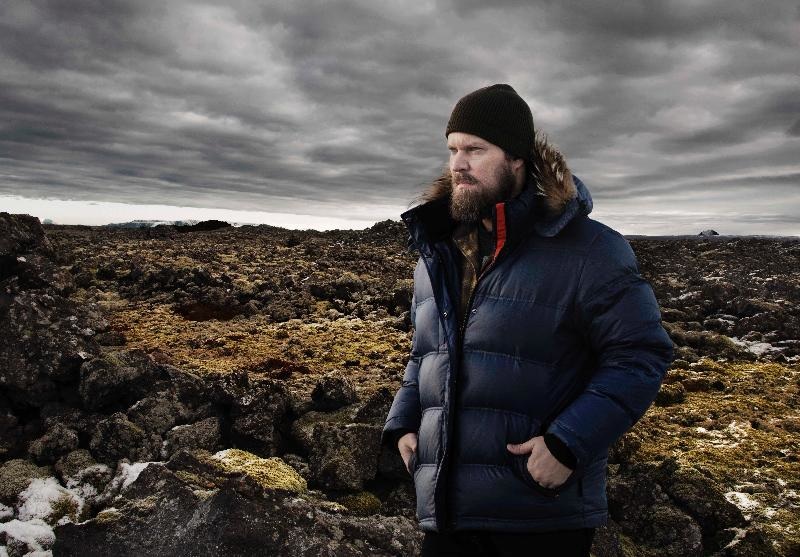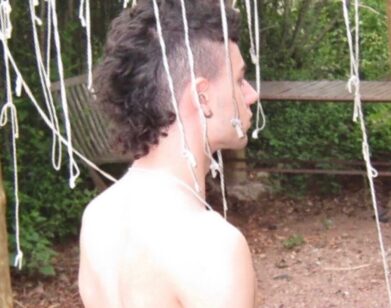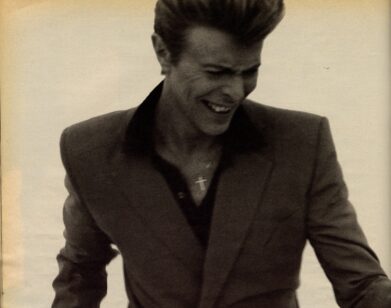John Grant Gets Comfortable

ABOVE: JOHN GRANT. PHOTO COURTESY OF GARÐAR ÓLAFSSON
Before we begin our Skype conversation, John Grant asks politely if we’ll wait a minute while he “slips into something a little less comfortable.” The wry turn of phrase is indicative of Grant’s sense of humor, but it belies the friendly intimacy of our conversation (it helps that we’re talking to each other from the comfort of our respective beds in New York and Iceland), as well as the nature of his work. Pale Green Ghosts, Grant’s sophomore album that was recently appointed Rough Trade’s Album of the Year, is a culmination of the singer-songwriter’s lifelong struggle to overcome his demons—Grant, who announced that he was HIV-positive at a London concert last year, struggled with drug and alcohol abuse for the better part of a decade and is still working through the torment he endured growing up gay in a small Colorado town—and feel at ease in his own skin.
Pale Green Ghosts is a departure both musically and emotionally from Grant’s gorgeous 2010 solo debut, Queen of Denmark. Instead of using Texas-based folk rock outfit Midlake as his backing band, Grant traveled to Iceland to work with producer Biggi Veira, the synthesizer wizard behind Reykjavik electro-pop outfit GusGus. There, Grant found the means and inspiration for the kind of ’80s pop-informed songs he had always been interested in making. Where Queen celebrated Grant’s love for his lover—he said piano ballad “Caramel” was probably the best song he’ll ever write—Ghosts shoots synth-based barbs at that relationship’s painful dissolution. But Grant’s darker, industrial new sound struck a chord: everyone from Elton John to straight men have told Grant how much his music means to them. “That’s a beautiful thing,” says Grant, who returns to New York on December 2 to play the Music Hall of Williamsburg.
HARLEY BROWN: How did you discover your singing voice?
JOHN GRANT: I grew up singing in a church choir. I remember my sister saying once it sounded like I was holding back, and at some point I was able to overcome that. It seemed to start when I was in Germany, and I was playing around with some guys that had keyboards and guitars, and played at a couple of parties. That was the first time I performed. When I went home to the States, I amassed enough courage to decide that I wanted to form a band.
It’s been sort of a long journey for me because I don’t feel like a great singer. If I hear Christina Aguilera and people who are technically amazing, I sometimes think, “I should have studied voice,” or, “I should have a teacher.” Somehow that doesn’t seem to ring true for me. There’s all sorts of different types of voices, and it’s nice for me to be happy with who I am. I’m not holding back anymore. I could probably use some tips from a vocal trainer or something about breathing, but we all know it’s not about technical prowess.
BROWN: In interviews, you’ve said you don’t think of yourself as a songwriter, or a musician, or a synth nerd, but Bob Mould and Sinead O’Connor [who sings backup on Pale Green Ghosts] have given you accolades. Is that something you can internalize?
GRANT: That’s a multifaceted issue for me. Say I feel like shit and look in the mirror and am like, “Fuck, you again.” I can think of those things and think, “Sinead O’Connor, well, she thinks I’m great, and I think she’s great, so I must be great.” But I also know that my self-worth can’t come from any one person, and it can’t come from my ability to sing or make music. I don’t have to justify myself by saying I speak five languages. When I got into languages, I needed to amass things to make myself more palatable or more acceptable as a human. At least if I’m a horrible pervert who’s going to hell, I’ll be fun to be around, or I’ll be thought of as smart, or I’ll matter in some way.
BROWN: You’ve said you have an addictive personality—do you think learning so many languages is an example of getting addicted?
GRANT: Maybe, but language has done me no harm whatsoever. I suppose I did annoy the shit out of my family—they were like, “Please shut the fuck up about German grammar.” Maybe I’ll go back to school and get a teaching certificate and teach Russian or Spanish grammar at a university when I’m older. I can get people excited about it—for example, in New York City, when you meet someone like a sommelier who knows their shit about wine, they get you excited about it, too. There’s this beverage director named Juliette Pope at the Gramercy Tavern, where I worked for three years, and she didn’t want to make you feel bad for what you didn’t know. She just wanted to meet you at your level and bring you further up. That’s what people need in a teacher.
BROWN: It sounds like synthesizer-based music has always interested you, so what catalyzed the change toward that on Pale Green Ghosts?
GRANT: It was always going to happen, it just happened to be at the right time. I was right to choose [producer] Biggi [Veira] because he’s great at sound design. I’d bring in sketches of songs and he would find the right sounds: bigger, bolder, more adult sounds. I also want to produce, but it’s important to recognize one’s limitations and say this is something you want to be good at, but for the time being you’re not quite where you’d like to be, so let’s bring on somebody who knows everything. I would really like to work with somebody like James Murphy. Those albums he makes are just beautiful.
BROWN: On “Sensitive New Age Guy,” your voice is like James Murphy’s, and the cowbell in the background… Was that intentional?
GRANT: Oh yeah. That was a shout-out to him, but also the music I listened to when I was younger: Ministry, Skinny Puppy, poppy stuff like Scritti Politti and Strawberry Switchblade and Siouxsie and the Banshees and the Cocteau Twins. I just can’t get enough of that shit, even to this day, but I love James Murphy’s voice. He was one of the guys that inspired me to try that. I always saw myself as someone who can only do this or only do that. Sure, one has their strengths and weaknesses, but you can pretty much do anything you want as long as you realize that.
BROWN: It seems like you and he have had similar trajectories in life. I saw a talk with him in which he said he was in therapy twice a week for 10 years because he needed to get out of his own way.
GRANT: That almost makes me want to tear up a little bit. That’s the thing, getting the fuck out of your own way. I need to meet that guy. There are certain things I listen to of his, and it makes me a little bit angry, because I think, “This has already been done, so what the fuck am I supposed to do now?” I feel that way about certain things Goldfrapp has done, and Björk. There’s so much talent out there. I’ve been listening to the new Kim Gordon record. I can’t tell you how exciting it is to be in Iceland in my comfy little apartment with the wind and the snow raging outside and listening to that new Body/Head record.
BROWN: When you’re talking about all of these records and how they provide solace for you—going back to what you said about having a teacher—your record is almost like a self-expression sommelier.
GRANT: That seems to be the case. When I talk to people after shows, they talk to me; especially the number of straight men that talk to me, in a way that communicates to me that they feel a connection with me that has nothing to do with sexuality. I do believe there seems to be some truth to what you’re saying, and that’s pretty magical.
BROWN: When writing lyrics, is it easier to come up with zingers like “You’ve got a black belt in BS” or the more confessional lyrics?
GRANT: It depends on the moment. The snappier lyrics come when I’m feeling really good and up. A lot of times they come after I’ve just had a meeting with somebody that was uplifting, and you get home, and you’re feeling playful or upbeat or whatever and then they just seem to pop right out. But then when I get into a dark place, I can really churn out those dark lyrics too. I’ve been beaten down by alcohol, and drugs, and a lot of the addictions I’ve dealt with. I’ve been very humbled by that, and I understand that there are a lot of things you cannot control in this world.
BROWN: Circling back to your voice, it sounds the most confident it’s ever been on this record—and you’re experimenting with the vocal manipulation on “Ernest Borgnine” and with the James Murphy thing—so it seems like you’re gaining control over your expression.
GRANT: Yeah, but then you get sick. There are always these little reminders that you’re not calling the shots. There’s nothing you can do when you lose your voice. You can take care of it all you want but shit’s going to happen that you’re not going to foresee, and you just have to sort of go with it. You can sit there for hours going, “What did I do? Is it because I had a Diet Coke last night? Because I didn’t realize the temperature was a little bit lower and I didn’t have my scarf on?” It just happens.
BROWN: When you said you were diagnosed as HIV positive, you said, I could go buck-wild and have a hedonistic rest of my life or I could buckle down and live the hard road ahead of me. I thought it was incredible that you chose the latter. That seems to have taken a remarkable amount of control.
GRANT: That has to do with being honest with yourself. In AA, for example, they say, “Play the tape to the end.” That’s one of the sayings they have that sounds ridiculous, but actually it’s great. You go back to the days when you were coming down off cocaine and suicidal, or all these things that you went through, and you play the tape to the end. Yes, you felt great, and the sex was amazing, and going to the club, and being around all these people, it seemed like a great time. But you play the tape to the end and realize what a miserable time it was.
I realized I don’t want to go back there. I wasn’t a brother to my sister or my brothers, I wasn’t a son to my father, I wasn’t a friend to my friends. I don’t want to be so wrapped up in my own bullshit that I can’t take part in people’s lives. It’s really a no-brainer. It’s much better to be awake and experiencing life than to be completely numb and try to escape all the time and not being able to.
PALE GREEN GHOSTS IS OUT NOW. JOHN GRANT WILL PLAY MUSIC HALL OF WILLIAMSBURG ON MONDAY, DECEMBER 2. FOR MORE ON THE ARTIST, PLEASE VISIT HIS WEBSITE.






